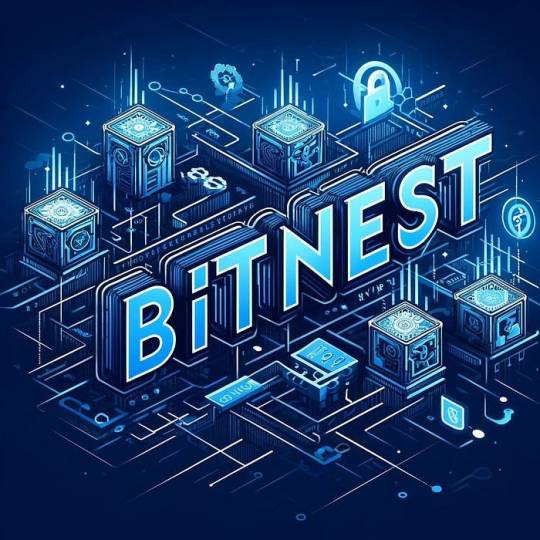#digital marketing service provider in us
Text
#digital marketing service provider in us#best digital marketing agency#artificial intelligence service provider in us#web design and development company in us#digital marketing agency#app design and development companies in us#affordable web design companies in us#website development company usa#ad campaigning service provider in us#brand building and logo creation company
0 notes
Text


In the current rapidly evolving digital currency market, decentralized finance (DeFi) platforms are redefining the shape of financial services with their unique advantages. Bit Loop, as a leading decentralized lending platform, not only provides a safe and transparent lending environment, but also opens up new passive income channels for users through its innovative sharing reward system.
Personal links and permanent ties: Create a stable revenue stream
One of the core parts of Bit Loop is its recommendation system, which allows any user to generate a unique sharing link when they join the platform. This link is not only a “key” for users to join the Bit Loop, but also a tool for them to establish an offline network. It is worth noting that offline partners who join through this link are permanently tied to the recommender, ensuring that the sharer can continue to receive rewards from the offline partner’s activities.
Unalterable referral relationships: Ensure fairness and transparency
A significant advantage of blockchain technology is the immutability of its data. In Bit Loop, this means that once a referral link and live partnership is established, the relationship is fixed and cannot be changed. This design not only protects the interests of recommenders, but also brings a stable user base and activity to the platform, while ensuring the fairness and transparency of transactions.
Automatically distribute rewards: Simplify the revenue process
Another highlight of the Bit Loop platform is the ability for smart contracts to automatically distribute rewards. When the partner completes the circulation cycle, such as investment returns or loan payments, the smart contract automatically calculates and sends the corresponding percentage of rewards directly to the recommender’s wallet. This automatic reward distribution mechanism not only simplifies the process of receiving benefits, but also greatly improves the efficiency of capital circulation.
Privacy protection and security: A security barrier for funds
All transactions and money flows are carried out on the blockchain, guaranteeing transparency and traceability of every operation. In addition, the use of smart contracts significantly reduces the risk of fraud and misoperation, providing a solid security barrier for user funds. Users can confidently invest and promote boldly, and enjoy the various conveniences brought by decentralized finance.
conclusion
As decentralized finance continues to evolve, Bit Loop offers a new economic model through its unique recommendation system that enables users to enjoy highly secure and transparent financial services while also earning passive income by building and maintaining a personal network. Whether for investors seeking stable passive income or innovators looking to explore new financial possibilities through blockchain technology, Bit Loop provides a platform not to be missed.

#In the current rapidly evolving digital currency market#decentralized finance (DeFi) platforms are redefining the shape of financial services with their unique advantages. Bit Loop#as a leading decentralized lending platform#not only provides a safe and transparent lending environment#but also opens up new passive income channels for users through its innovative sharing reward system.#Personal links and permanent ties: Create a stable revenue stream#One of the core parts of Bit Loop is its recommendation system#which allows any user to generate a unique sharing link when they join the platform. This link is not only a “key” for users to join the Bi#but also a tool for them to establish an offline network. It is worth noting that offline partners who join through this link are permanent#ensuring that the sharer can continue to receive rewards from the offline partner’s activities.#Unalterable referral relationships: Ensure fairness and transparency#A significant advantage of blockchain technology is the immutability of its data. In Bit Loop#this means that once a referral link and live partnership is established#the relationship is fixed and cannot be changed. This design not only protects the interests of recommenders#but also brings a stable user base and activity to the platform#while ensuring the fairness and transparency of transactions.#Automatically distribute rewards: Simplify the revenue process#Another highlight of the Bit Loop platform is the ability for smart contracts to automatically distribute rewards. When the partner complet#such as investment returns or loan payments#the smart contract automatically calculates and sends the corresponding percentage of rewards directly to the recommender’s wallet. This au#but also greatly improves the efficiency of capital circulation.#Privacy protection and security: A security barrier for funds#All transactions and money flows are carried out on the blockchain#guaranteeing transparency and traceability of every operation. In addition#the use of smart contracts significantly reduces the risk of fraud and misoperation#providing a solid security barrier for user funds. Users can confidently invest and promote boldly#and enjoy the various conveniences brought by decentralized finance.#conclusion#As decentralized finance continues to evolve#Bit Loop offers a new economic model through its unique recommendation system that enables users to enjoy highly secure and transparent fin
1 note
·
View note
Text

#Expert Web Designing#A Website Designing Company in Ahmedabad is a full service Digital Marketing Company in Ahmedabad#Providing excellent digital solutions over 12+ years. Our custom solutions are made to fulfill each client’s unique goals#empowering our partners to use the web to its full potential while exceeding expectations along the way. As a Best Web Development Company#we have the experience and specialized knowledge to deliver outstanding solutions for regulation compliance heavy industries. We also provi#Master in Digital Markeitng Course in Ahmedabad#Search Engine Optimization Course in Ahmedabad#WordPress Course in Ahmedabd & lot.#At Expert Web Designing#our bespoke Web Designing#Digital Marketing & all services are always tailored to suit the needs of each client. Whether we are updating an existing function or crea#we combine creativity with technological know-how. We will help your business grow to new heights through qualified online exposure. We put#strategies and proven conversion techniques. Our experience#coupled with our passion#has afforded us the opportunity to maintain long-term relationships with our clients. Partnering with us will help your business succeed an#and at the same time#keep our fees affordable
1 note
·
View note
Text
#SEO Consultant USA#SEO Company US#SEO Experts USA#USA SEO#California Search Engine Optimization#SEO Company in California#Digital Marketing Company USA#Digital Marketing Service Provider
0 notes
Text
At our digital marketing agency, we are more than just experts – we are game-changers, trend-setters, and growth catalysts. With years of experience under our belt, we have honed our skills in crafting innovative strategies that captivate audiences and drive unparalleled results. Our team of creative minds, data enthusiasts, and tech wizards is dedicated to surpassing expectations and delivering exceptional outcomes for our clients. From search engine optimization to social media marketing, content creation to email campaigns, we possess a diverse range of expertise to fuel your digital success. We are not just a reliable co-working space, but the undeniable choice for those who seek extraordinary results. Join us today and experience the difference that makes us the best in the industry.
#digital marketing agency in ahmedabad#contact us for digital marketing agency#digital agency#best digital marketing agency in ahmedabad#digital marketing service provider
1 note
·
View note
Text
@digi_ads_

#Take Your Business To Next Level And Grow Your Audience📍#•#We provide various digital services like -#⭐️ Social Media Marketing#⭐️ SEO#⭐️ Paid Advertising (Facebook Ads#Instagram Ads#Google Ads)#⭐️ Content Writing#DM us or contact @digi_ads_#📞+91 9625939824#for consultation and more info#FACEBOOK LINK https://www.facebook.com/profile.php?id=100093597170215#LINKDEN LINK https://www.linkedin.com/in/grow-by-digiads-030570280/#TWITTER LINK https://twitter.com/GDigiads63443#PINTEREST https://in.pinterest.com/digi_ads_/#gda#gdaonline#digitalmarketingagencyonline#digitalmarkeing#digitalmarketingservices#socialmediamarketing#socialmediamarketingagency#socialmedia#socialmediatips#marketingstrategy#digitalmarketingstrategy#GoogleAdsTips#AdWordsTips#PPCMarketing
0 notes
Text

#https://ss-financial-and-digital-service.business.site/...#S&S Financial And Digital Services ! We provide all types of financially and digital promotion services with Taxation.#Such as - Life Insurance / Food Licence / Motor vehicle insurance / Financial advise / GST Registration#Company Registration / Digital Marketing and many more.#For more information contact us on -#9430474982 / 787023199#FinancialProjections#financialfr33dom#financialadvise#financialreport#financialmemes#financialgym#financialfreedomfighter#financialfuture#financialguru#financialsub#financialconcepts#financialmarketing#financialleadershipgroup#financialadvisers#financialresults#financialcapital#FinancialSector#financialgoddess#financialterrorism#financialinstitution
0 notes
Text

Arsh balqees Advertisement
Our Services
3d sign Board Making
Sticker Making
3d Letters
Making safety and road signs
Digital Flex & Sticker Printing
Advertising/Marketing
3D signage, 3D Letters, Neon, Billboards, LED Signage, Flex etc.
Arsh Balqees Advertising is a creative agency that provides a wide range of services including branding, advertising, digital marketing, and printing solutions.
For More Info Contact us
+971 50 614 8513
#Arsh balqees Advertisement#Our Services#3d sign Board Making#Sticker Making#3d Letters#Making safety and road signs#Digital Flex & Sticker Printing#Advertising/Marketing#3D signage#3D Letters#Neon#Billboards#LED Signage#Flex etc.#Arsh Balqees Advertising is a creative agency that provides a wide range of services including branding#advertising#digital marketing#and printing solutions.#For More Info Contact us#+971 50 614 8513
1 note
·
View note
Text
Get the ultimate guide on sports digital marketing. Read this blog to discover the most relevant tactics of effective marketing strategy.
#digital marketing agency#digital marketing service provider#best digital marketing company in us#best digital marketing agency
0 notes
Text
#Digital Marketing service provider in US#Social Media Content writing service provider#web design and development company in US#affordable web design companies in US#web design and development company#App design and development companies in US#Brand building and Logo creation company#SEO Service provider company in US#Social media marketing service provider#Trusted Digital Marketing Firms in US#Ad campaigning service provider in US
0 notes
Text
Is Custom Web Application Development Right for Your Business?

#time is money#app development#web development#webdesigning#technology#People have grown accustomed to having all of their digital requirements answered promptly with the push of a button#resulting in a growth in the bespoke web application market in recent years. As a business owner#this requirement for quick gratification may appear ridiculous#but if you cannot give your clients what they want when they want it#it can reflect poorly on your ability and hence your firm. As a result#more and more businesses are turning to software programs to stay relevant in today's technological age.#Custom web applications aid in the organization of your business and the unification of operations. You will be able to operate with an inf#scaling up or down based on your needs at the time. Why should you choose custom web application development? If you want to stand out from#both by making a good first impression and by providing a high-quality product or service#you should consider custom web development.#Get a solution that is tailored to your company's objectives.#There are numerous web apps accessible to meet a variety of needs#but they are also designed to serve a diverse range of consumers. This frequently results in them having a more wide and more generic natur#the developers of such programs work hard to make them even more useful and to include popular features. Your company should not rely on ot#When you pick bespoke web application development#you will collaborate with professionals to create the solution that you require. You establish the expectations#and if something is unnecessary or missing#it is eliminated or added based on your request. In this manner#you get an app that aids your workflow rather than one that requires you to adjust to it.#Reap the benefit of continued assistance from skilled developers.#This second argument was originally mentioned in the first. Things get done when you need them to with custom web app development. Any main#and any potential concerns will be rectified as soon as possible. You will no longer need to rely on others to identify whether your tools#maintained#or updated. Furthermore#you will not outgrow the software because it will adapt to your business's growth. The developer will never decide to abandon the app
1 note
·
View note
Text
Surveillance pricing

THIS WEEKEND (June 7–9), I'm in AMHERST, NEW YORK to keynote the 25th Annual Media Ecology Association Convention and accept the Neil Postman Award for Career Achievement in Public Intellectual Activity.

Correction, 7 June 2024: The initial version of this article erroneously described Jeffrey Roper as the founder of ATPCO. He benefited from ATPCO, but did not co-found it. The initial version of this article called ATPCO "an illegal airline price-fixing service"; while ATPCO provides information that the airlines use to set prices, it does not set prices itself, and while the DOJ investigated the company, they did not pursue a judgment declaring the service to be illegal. I regret the error.
Noted anti-capitalist agitator Adam Smith had it right: "People of the same trade seldom meet together, even for merriment and diversion, but the conversation ends in a conspiracy against the public, or in some contrivance to raise prices."
Despite being a raving commie loon, Smith's observation was so undeniably true that regulators, policymakers, and economists couldn't help but acknowledge that it was true. The trustbusting era was defined by this idea: if we let the number of companies in a sector get too small, or if we let one or a few companies get too big, they'll eventually start to rig prices.
What's more, once an industry contracts corporate gigantism, it will become too big to jail, able to outspend and overpower the regulators charged with reining in its cheating. Anyone who believes Smith's self-evident maxim had to accept its conclusion: that companies had to be kept smaller than the state that regulated them. This wasn't about "punishing bigness" – it was the necessary precondition for a functioning market economy.
We kept companies small for the same reason that we limited the height of skyscrapers: not because we opposed height, or failed to appreciate the value of a really good penthouse view – rather, to keep the building from falling over and wrecking all the adjacent buildings and the lives of the people inside them.
Starting in the neoliberal era – Carter, then Reagan – we changed our tune. We liked big business. A business that got big was doing something right. It was perverse to shut down our best companies. Instead, we'd simply ban big companies from rigging prices. This was called the "consumer welfare" theory of antitrust. It was a total failure.
40 years later, nearly every industry is dominated by a handful of companies, and these companies price-gouge us with abandon. Worse, they use their gigantic ripoff winnings to fill war-chests that fund the corruption of democracy, capturing regulators so that they can rip us off even more, while ignoring labor, privacy and environmental law and ducking taxes.
It turns out that keeping gigantic, opaque, complex corporations honest is really hard. They have so many ways to shuffle money around that it's nearly impossible to figure out what they're doing. Digitalization makes things a million times worse, because computers allow businesses to alter their processes so they operate differently for every customer, and even for every interaction.
This is Dieselgate times a billion: VW rigged its cars to detect when they were undergoing emissions testing and switch to a less polluting, more compliant mode. But when they were on the open road, they spewed lethal quantities of toxic gas, killing people by the thousands. Computers don't make corporate leaders more evil, but they let evil corporate leaders execute far more complex and nefarious plans. Digitalization is a corporate moral hazard, making it just too easy and tempting to rig the game.
That's why Toyota, the largest car-maker in the world, just did Dieselgate again, more than a decade later. Digitalization is a temptation no giant company can resist:
https://www.bbc.com/news/articles/c1wwj1p2wdyo
For forty years, pro-monopoly cheerleaders insisted that we could allow companies to grow to unimaginable scale and still prevent cheating. They passed rules banning companies from explicitly forming agreements to rig prices. About ten seconds later, new middlemen popped up offering "information brokerages" that helped companies rig prices without talking to one another.
Take Agri Stats: the country's hyperconcentrated meatpacking industry pays Agri Stats to "consult on prices." They provide Agri Stats with a list of their prices, and then Agri Stats suggests changes based on its analysis. What does that analysis consist of? Comparing the company's prices to its competitors, who are also Agri Stats customers:
https://pluralistic.net/2023/10/04/dont-let-your-meat-loaf/#meaty-beaty-big-and-bouncy
In other words, Agri Stats finds the highest price for each product in the sector, then "advises" all the companies with lower prices to raise their prices to the "competitive" level, creating a one-way ratchet that sends the price of food higher and higher.
More and more sectors have an Agri Stats, and digitalization has made this price-gouging system faster, more efficient, and accessible to sectors with less concentration. Landlords, for example, have tapped into Realpage, a "data broker" that the same thing to your rent that Agri Stats does to meat prices. Realpage requires the landlords who sign up for its service to accept its "recommendations" on minimum rents, ensuring that prices only go up:
https://popular.info/p/feds-raid-corporate-landlord-escalating
Writing for The American Prospect, Luke Goldstein lays out the many ways in which these digital intermediaries have supercharged the business of price-rigging:
https://prospect.org/economy/2024-06-05-three-algorithms-in-a-room/
Goldstein identifies a kind of patient zero for this ripoff epidemic: Jeffrey Roper, a former Alaska Air exec who benefited from a service that helps airlines set prices. ATPCO was investigated by the DOJ in the 1990s, but the enforcers lost their nerve and settled with the company, which agreed to apply some ornamental fig-leafs to its collusion-machine. Even those cosmetic changes were seemingly a bridge too far Roper, who left the US.
But he came back to serve as Realpage's "principal scientist" – the architect of a nationwide scheme to make rental housing vastly more expensive. For Roper, the barrier to low rents was empathy: landlords felt stirrings of shame when they made shelter unaffordable to working people. Roper called these people "idiots" who sentimentality "costs the whole system."
Sticking a rent-gouging computer between landlords and the people whose lives they ruin is a classic "accountability sink," as described in Dan Davies' new book "The Unaccountability Machine: Why Big Systems Make Terrible Decisions – and How The World Lost its Mind":
https://profilebooks.com/work/the-unaccountability-machine/
It's a form of "empiricism washing": if computers are working in the abstract realm of pure numbers, they're just moving the objective facts of the quantitative realm into the squishy, imperfect qualitative world. Davies' interview on Trashfuture is excellent:
https://trashfuturepodcast.podbean.com/e/fire-sale-at-the-accountability-store-feat-dan-davies/
To rig prices, an industry has to solve three problems: the problem of coming to an agreement to fix prices (economists call this "the collective action problem"); the problem of coming up with a price; and the problem of actually changing prices from moment to moment. This is the ripoff triangle, and like a triangle, it has many stable configurations.
The more concentrated an industry is, the easier it is to decide to rig prices. But if the industry has the benefit of digitalization, it can swap the flexibility and speed of computers for the low collective action costs from concentration. For example, grocers that switch to e-ink shelf tags can make instantaneous price-changes, meaning that every price change is less consequential – if sales fall off after a price-hike, the company can lower them again at the press of a button. That means they can collude less explicitly but still raise prices:
https://pluralistic.net/2024/03/26/glitchbread/#electronic-shelf-tags
My name for this digital flexibility is "twiddling." Businesses with digital back-ends can alter their "business logic" from second to second, and present different prices, payouts, rankings and other key parts of the deal to every supplier or customer they interact with:
https://pluralistic.net/2023/02/19/twiddler/
Not only does twiddling make it easier to rip off suppliers, workers and customers, it also makes these crimes harder to detect. Twiddling made Dieselgate possible, and it also underpinned "Greyball," Uber's secret strategy of refusing to send cars to pick up transportation regulators who would then be able to see firsthand how many laws the company was violating:
https://www.nytimes.com/2017/03/03/technology/uber-greyball-program-evade-authorities.html
Twiddling is so easy that it has brought price-fixing to smaller companies and less concentrated sectors, though the biggest companies still commit crimes on a scale that put these bit-players to shame. In The Prospect, David Dayen investigates the "personalized pricing" ripoff that has turned every transaction into a potential crime-scene:
https://prospect.org/economy/2024-06-04-one-person-one-price/
"Personalized pricing" is the idea that everything you buy should be priced based on analysis of commercial surveillance data that predicts the maximum amount you are willing to pay.
Proponents of this idea – like Harvard's Pricing Lab with its "Billion Prices Project" – insist that this isn't a way to rip you off. Instead, it lets companies lower prices for people who have less ability to pay:
https://thebillionpricesproject.com/
This kind of weaponized credulity is totally on-brand for the pro-monopoly revolution. It's the same wishful thinking that led regulators to encourage monopolies while insisting that it would be possible to prevent "bad" monopolies from raising prices. And, as with monopolies, "personalized pricing" leads to an overall increase in prices. In econspeak, it is a "transfer of wealth from consumer to the seller."
"Personalized pricing" is one of those cuddly euphemisms that should make the hair on the back of your neck stand up. A more apt name for this practice is surveillance pricing, because the "personalization" depends on the vast underground empire of nonconsensual data-harvesting, a gnarly hairball of ad-tech companies, data-brokers, and digital devices with built-in surveillance, from smart speakers to cars:
https://pluralistic.net/2024/03/12/market-failure/#car-wars
Much of this surveillance would be impractical, because no one wants their car, printer, speaker, watch, phone, or insulin-pump to spy on them. The flexibility of digital computers means that users always have the technical ability to change how these gadgets work, so they no longer spy on their users. But an explosion of IP law has made this kind of modification illegal:
https://locusmag.com/2020/09/cory-doctorow-ip/
This is why apps are ground zero for surveillance pricing. The web is an open platform, and web-browsers are legal to modify. The majority of web users have installed ad-blockers that interfere with the surveillance that makes surveillance pricing possible:
https://doc.searls.com/2023/11/11/how-is-the-worlds-biggest-boycott-doing/
But apps are a closed platform, and reverse-engineering and modifying an app is a literal felony – several felonies, in fact. An app is just a web-page skinned with enough IP to make it a felony to modify it to protect your consumer, privacy or labor rights:
https://pluralistic.net/2024/05/07/treacherous-computing/#rewilding-the-internet
(Google is leading a charge to turn the web into the kind of enshittifier's paradise that apps represent, blocking the use of privacy plugins and proposing changes to browser architecture that would allow them to felonize modifying a browser without permission:)
https://pluralistic.net/2023/08/02/self-incrimination/#wei-bai-bai
Apps are a twiddler's playground. Not only can they "customize" every interaction you have with them, but they can block you (or researchers seeking to help you) from recording and analyzing the app's activities. Worse: digital transactions are intimate, contained to the palm of your hand. The grocer whose e-ink shelf-tags flicker and reprice their offerings every few seconds can be collectively observed by people who are in the same place and can start a conversation about, say, whether to come back that night a throw a brick through the store's window to express their displeasure. A digital transaction is a lonely thing, atomized and intrinsically shielded from a public response.
That shielding is hugely important. The public hates surveillance pricing. Time and again, through all of American history, there have been massive and consequential revolts against the idea that every price should be different for every buyer. The Interstate Commerce Commission was founded after Grangers rose up against the rail companies' use of "personalized pricing" to gouge farmers.
Companies know this, which is why surveillance pricing happens in secret. Over and over, every day, you are being gouged through surveillance pricing. The sellers you interact with won't tell you about it, so to root out this practice, we have to look at the B2B sales-pitches from the companies that sell twiddling tools.
One of these companies is Plexure, partly owned by McDonald's, which provides the surveillance-pricing back-ends for McD's, Ikea, 7-Eleven, White Castle and others – basically, any time a company gives you a hard-sell to order via its apps rather than its storefronts or its website, you should assume you're getting twiddled, hard.
These companies use the enshittification playbook to trap you into using their apps. First, they offer discounts to customers who order through their apps – then, once the customers are fully committed to shopping via app, they introduce surveillance pricing and start to jack up the prices.
For example, Plexure boasts that it can predict what day a given customer is getting paid on and use that information to raise prices on all the goods the customer shops for on that day, on the assumption that you're willing to pay more when you've got a healthy bank balance.
The surveillance pricing industry represents another reason for everything you use to spy on you – any data your "smart" TV or Nest thermostat or Ring doorbell can steal from you can be readily monetized – just sell it to a surveillance pricing company, which will use it to figure out how to charge you more for everything you buy, from rent to Happy Meals.
But the vast market for surveillance data is also a potential weakness for the industry. Put frankly: the commercial surveillance industry has a lot of enemies. The only thing it has going for it is that so many of these enemies don't know that what's they're really upset about is surveillance.
Some people are upset because they think Facebook made Grampy into a Qanon. Others, because they think Insta gave their kid anorexia. Some think Tiktok is brainwashing millennials into quoting Osama bin Laden. Some are upset because the cops use Google location data to round up Black Lives Matter protesters, or Jan 6 insurrectionists. Some are angry about deepfake porn. Some are angry because Black people are targeted with ads for overpriced loans or colleges:
https://www.theregister.com/2024/06/04/meta_ad_algorithm_discrimination/
And some people are angry because surveillance feeds surveillance pricing. The thing is, whatever else all these people are angry about, they're all angry about surveillance. Are you angry that ad-tech is stealing a 51% share of news revenue? You're actually angry about surveillance. Are you angry that "AI" is being used to automatically reject resumes on racial, age or gender grounds? You're actually angry about surveillance.
There's a very useful analogy here to the history of the ecology movement. As James Boyle has long said, before the term "ecology" came along, there were people who cared about a lot of issues that seemed unconnected. You care about owls, I care about the ozone layer. What's the connection between charismatic nocturnal avians and the gaseous composition of the upper atmosphere? The term ecology took a thousand issues and welded them together into one movement.
That's what's on the horizon for privacy. The US hasn't had a new federal consumer privacy law since 1988, when Congress acted to ban video-store clerks from telling the newspapers what VHS cassettes you were renting:
https://en.wikipedia.org/wiki/Video_Privacy_Protection_Act
We are desperately overdue for a new consumer privacy law, but every time this comes up, the pro-surveillance coalition defeats the effort. but as people who care about conspiratorialism, kids' mental health, spying by foreign adversaries, phishing and fraud, and surveillance pricing all come together, they will be an unbeatable coalition:
https://pluralistic.net/2023/12/06/privacy-first/#but-not-just-privacy
Meanwhile, the US government is actually starting to take on these ripoff artists. The FTC is working to shut down data-brokers:
https://pluralistic.net/2023/08/16/the-second-best-time-is-now/#the-point-of-a-system-is-what-it-does
The FBI is raiding landlords to build a case against Frontpage and other rent price-fixers:
https://popular.info/p/feds-raid-corporate-landlord-escalating
Agri Stats is facing a DoJ lawsuit:
https://www.nationalhogfarmer.com/market-news/agri-stats-loses-motions-to-transfer-dismiss-in-doj-antitrust-case
Not every federal agency has gotten the message, though. Trump's Fed Chairman, Jerome Powell – whom Biden kept on the job – has been hiking interest rates in a bid to reduce our purchasing power by making millions of Americans poorer and/or unemployed. He's doing this to fight inflation, on the theory that inflation is being cause by us being too well-off, and therefore trying to buy more goods than are for sale.
But of course, interest rates are inflationary: when interest rates go up, it gets more expensive to pay your credit card bills, lease your car, and pay a mortgage. And where we see the price of goods shooting up, there's abundant evidence that this is the result of greedflation – companies jacking up their prices and blaming inflation. Interest rate hawks say that greedflation is impossible: if one company raises its prices, its competitors will swoop in and steal their customers with lower prices.
Maybe they would do that – if they didn't have a toolbox full of algorithmic twiddling options and a deep trove of surveillance data that let them all raise prices together:
https://prospect.org/blogs-and-newsletters/tap/2024-06-05-time-for-fed-to-meet-ftc/
Someone needs to read some Adam Smith to Chairman Powell: "People of the same trade seldom meet together, even for merriment and diversion, but the conversation ends in a conspiracy against the public, or in some contrivance to raise prices."

If you'd like an essay-formatted version of this post to read or share, here's a link to it on pluralistic.net, my surveillance-free, ad-free, tracker-free blog:
https://pluralistic.net/2024/06/05/your-price-named/#privacy-first-again

Image:
Cryteria (modified)
https://commons.wikimedia.org/wiki/File:HAL9000.svg
CC BY 3.0
https://creativecommons.org/licenses/by/3.0/deed.en
#pluralistic#david dayen#the american prospect#surveillance advertising#commercial surveillance#predictive pricing#monopolism#monopolies#antitrust#unfair and deceptive method of competition#ftc act Section 5#ftca5#ripoffs#surveillance#twiddling#ip#apps#apps are shit#ziprecruiter#personalized pricing#price gouging#just and reasonable#interstate commerce act#one person one price#surveillance pricing#privacy first#billion prices project#ecommerce#ninetailed#cortado group
420 notes
·
View notes
Text
New August Masterpost
If you are unaware of the situation in our country, the argentinean government is fucking up the economy with their "chainsaw" plan, and getting rid of human rights in the process, among other things. The prices are up, including public transport, and the salaries aren't rising with them.
This masterpost was made in order give our artists the opportunity to enter the international market since our currency is plummeting, so if you like what you see please consider commissioning us. If you aren't able to, reblog this post please, WE NEED THE VISIBILITY.
Alt texts are in English and Spanish.
____________________________
Si no conocés la situación en nuestro país, el gobierno argentino esta haciendo mierda la economía con su plan "motosierra", y deshaciéndose de derechos humanos en el proceso, entre otras cosas. Los precios suben, incluído el transporte público, y los salarios no suben con ellos.
Este masterpost se hizo para darles a nuestres artistas la oportunidad de entrar en el mercado internacional ya que nuestra divisa va cayendo en picada, así que si te gusta lo que ves considera comisionarnos. Si no podés, rebloguea el post por favor, NECESITAMOS VISIBILIDAD.
Textos alternativos (alt text) están en inglés y español.
@lucianinsanity
(he/they - él)

An is an artist that works primarily on character design, including small sprites in pixel art. They can also paint backgrounds or landscapes and scenes. They work with watercolors, acrylics, pencils and digitally.
________________________________
An es un artista que se dedica principalmente al diseño de personajes, incluidos pequeños sprites en pixel art. También puede pintar fondos o paisajes y escenas. Trabaja con acuarelas, acrílicos, lápices y en digital.
Contacts/Links:
Instagram: https://www.instagram.com/lucianinsanity/
Tumblr:
https://lucianinsanity-only-art.tumblr.com/
https://lucianinsanity.tumblr.com/
Ko-Fi: https://ko-fi.com/lucianinsanity
YouTube: https://www.youtube.com/@lucianinsanity
@aifastic
(they/she/he - ella/él)

Aifas is an artist whose work revolves primarily around characters, backgrounds and animals (generally pets). They like making goofy art, cartoons, animations and pictures where colors pop! They have worked on several fanzines, including the TF2 Sona Zine and Rocket Science! A TF2 Helmet Party Zine as an artist, and Wanted - An A Way Out Zine as both an artist and graphic designer.
________________________________
Aifas es una artista cuyo trabajo se concentra principalmente en personajes, escenarios y animales (generalmente mascotas). Le gusta hacer arte gracioso, caricaturas, animaciones y piezas en los que los colores saltan a la vista. Trabajó en numerosas fanzines, incluyendo TF2 Sona Zine y Rocket Science! A TF2 Helmet Party Zine como artista, y Wanted - An A Way Out Zine como artista y diseñadora gráfica.
Contacts/Links:
Instagram: https://www.instagram.com/aifastic/
Tumblr: https://aifastic.tumblr.com/
Ko-Fi: https://ko-fi.com/aifastic
E-mail: [email protected]
@denwenai
(they/them - elle)

Denwenai’s areas of expertise are multimedia design, photography and art; therefore, their pieces are a living example of the convergence of these disciplines. They work on both digital and physical media, and although their pieces are often inspired by film, literature & popular culture, many are a product of their restless imagination.
Among the services they provide are illustration, vectoring, editorial layout, branding video & photo editing and motion graphics.
________________________________
Denwenai se dedica al diseño multimedia, la fotografía y el arte; por lo que sus piezas son ejemplo de la convergencia de estas disciplinas. Trabaja sobre soportes tanto físicos como digitales, y sus piezas a menudo encuentran inspiración en el cine, la literatura y la cultura popular, aunque muchas son producto de su inquieta imaginación.
Entre los servicios que puede brindar se incluyen: ilustración, vectorizado, maquetado editorial, branding, edición de foto/video y motion graphics.
Contacts/Links:
Linktree: https://linktr.ee/denwenai
@tomicaleto
(she/her - ella)

On the internet, I go by the pseud Tomicaleto and I'm mostly called Tomi. I'm currently studying Philosophy and Visual arts in university.
On my Tumblr I share mostly fanarts from different fandoms and my digital artwork. I've participated in fanzines along with other artists and on weekly and monthly events as well (such as the bingo format events, for example).
I've also begun to sell my drawings as stickers, illustrations and t-shirts, participating in local events when possible (Currently only in Argentina).
________________________________
En internet me muevo bajo el pseudónimo Tomicaleto y muchas veces me dicen Tomi. Estoy estudiando Filosofía y Artes Visuales en la universidad.
En mi Tumblr comparto mayormente fanarts de diferentes fandoms y mi trabajo digital. Participé en fanzines junto con otros artistas y también en eventos semanales y mensuales (el formato bingo, por ejemplo).
También comencé a vender mis dibujos como stickers, ilustraciones y remeras, participando en eventos locales cuando es posible (Solo en Argentina por el momento).
Contacts/Links:
Tumblr: https://tomicaleto.tumblr.com/
->Art tag: Tomi's art
@palluniskillas
(she/he, ella/él.)

Pallu is an artist that focuses on the creation of illustrations and portraits, as well as character creation. She mostly Works digitally. Her primary pallete is made up of warm colors and tones.
________________________________
Pallu es un artista que se enfoca en la creación de ilustraciones y retratos, como también la creación de personajes. Mayormente ella trabaja digitalmente. Su paleta principal está compuesta de colores y tonos cálidos.
Contacts/Links:
Instagram: https://www.instagram.com/pallunis_killas/
Tumblr: https://palluniskillas.tumblr.com/
If you want to support the admin, go to @artzover
#argentina#argie tumblr#argieblr#argie tag#argie posting#artistas argentines#artists on tumblr#artistas#signal boost#latam#latam artists#support small artists#third world#commissions open#commissions#illustration#illustrator#graphic design#graphic art#graphic designer#american politics#yeah i'm tagging it as that. we're here because of y'all#queer#queer art#queer artist#lgbtq#lgbtqia
97 notes
·
View notes
Text
The Expansive World of Altcoins: Exploring the Diversity Beyond Bitcoin

Bitcoin, the original cryptocurrency, has long dominated headlines and market discussions. However, the world of digital currencies is vast and diverse, with thousands of alternative coins, or altcoins, each offering unique features and value propositions. Altcoins encompass a broad range of projects, from utility tokens and stablecoins to meme coins and more. This article delves into the rich ecosystem of altcoins, highlighting their significance, various types, and the innovative projects that make up this vibrant space, including a mention of Sexy Meme Coin.
Understanding Altcoins
The term "altcoin" refers to any cryptocurrency that is not Bitcoin. These coins were developed to address various limitations of Bitcoin or to introduce new features and use cases. Altcoins have proliferated since the creation of Bitcoin in 2009, each aiming to offer something different, whether it be improved transaction speeds, enhanced privacy features, or specific utility within certain ecosystems.
Categories of Altcoins
Utility Tokens: Utility tokens provide users with access to a specific product or service within a blockchain ecosystem. Examples include Ethereum's Ether (ETH), which is used to power applications on the Ethereum network, and Chainlink's LINK, which is used to pay for services on the Chainlink decentralized oracle network.
Stablecoins: Stablecoins are designed to maintain a stable value by being pegged to a reserve of assets, such as fiat currency or commodities. Tether (USDT) and USD Coin (USDC) are popular stablecoins pegged to the US dollar, offering the benefits of cryptocurrency without the volatility.
Security Tokens: Security tokens represent ownership in a real-world asset, such as shares in a company or real estate. They are subject to regulatory oversight and are often seen as a bridge between traditional finance and the blockchain world.
Meme Coins: Meme coins are a playful and often humorous take on cryptocurrency, inspired by internet memes and cultural trends. While they may start as jokes, some have gained significant value and community support. Dogecoin is the most famous example, but many others, like Shiba Inu and Sexy Meme Coin, have also captured the public's imagination.
Privacy Coins: Privacy coins focus on providing enhanced privacy features for transactions. Monero (XMR) and Zcash (ZEC) are notable examples, offering users the ability to transact anonymously and protect their financial privacy.
The Appeal of Altcoins
Altcoins offer several advantages over Bitcoin, including:
Innovation: Many altcoins introduce new technologies and features, driving innovation within the cryptocurrency space. For example, Ethereum introduced smart contracts, enabling decentralized applications (DApps) and decentralized finance (DeFi) platforms.
Specialization: Altcoins often serve specific niches or industries, providing targeted solutions that Bitcoin cannot. For instance, Ripple (XRP) focuses on facilitating cross-border payments, while Filecoin (FIL) aims to create a decentralized storage network.
Investment Opportunities: The diverse range of altcoins presents numerous investment opportunities. Investors can diversify their portfolios by investing in projects with different use cases and growth potentials.
Notable Altcoins in the Market
Ethereum (ETH): Ethereum is the second-largest cryptocurrency by market capitalization and has become the backbone of the DeFi and NFT (Non-Fungible Token) ecosystems. Its smart contract functionality allows developers to create decentralized applications, leading to a thriving ecosystem of financial services, games, and more.
Cardano (ADA): Cardano is a blockchain platform focused on sustainability, scalability, and transparency. It uses a proof-of-stake consensus mechanism, which is more energy-efficient than Bitcoin's proof-of-work. Cardano aims to provide a more secure and scalable infrastructure for the development of decentralized applications.
Polkadot (DOT): Polkadot is designed to enable different blockchains to interoperate and share information. Its unique architecture allows for the creation of "parachains," which can operate independently while still benefiting from the security and connectivity of the Polkadot network.
Chainlink (LINK): Chainlink is a decentralized oracle network that provides real-world data to smart contracts on the blockchain. This functionality is crucial for the operation of many DeFi applications, making Chainlink a vital component of the blockchain ecosystem.
Sexy Meme Coin: Among the meme coins, Sexy Meme Coin stands out for its combination of humor and innovative tokenomics. It offers a decentralized marketplace where users can buy, sell, and trade memes as NFTs (Non-Fungible Tokens), rewarding creators for their originality. Learn more about Sexy Meme Coin at Sexy Meme Coin.
The Future of Altcoins
The future of altcoins looks promising, with continuous innovation and increasing adoption across various industries. As blockchain technology evolves, we can expect altcoins to introduce new solutions and disrupt traditional systems. However, the market is also highly competitive, and not all projects will succeed. Investors should conduct thorough research and due diligence before investing in any altcoin.
Conclusion
Altcoins represent a dynamic and diverse segment of the cryptocurrency market. From utility tokens and stablecoins to meme coins and privacy coins, each category offers unique features and potential benefits. Projects like Ethereum, Cardano, Polkadot, and Chainlink are leading the way in innovation, while niche coins like Sexy Meme Coin add a layer of cultural relevance and community engagement. As the cryptocurrency ecosystem continues to grow, altcoins will play a crucial role in shaping the future of digital finance and blockchain technology.
For those interested in the playful and innovative side of the altcoin market, Sexy Meme Coin offers a unique and entertaining platform. Visit Sexy Meme Coin to explore this exciting project and join the community.
107 notes
·
View notes
Text

#https://ss-financial-and-digital-service.business.site/...#S&S Financial And Digital Services ! We provide all types of financially and digital promotion services with Taxation.#Such as - Life Insurance / Food Licence / Motor vehicle insurance / Financial advise / GST Registration#Company Registration / Digital Marketing and many more.#For more information contact us on -#9430474982 / 7870231997#financialstatements#financialwisdom#financialimobiliaria#financialassitance#financialastrology#financialnuggets#FinancialCrimeCompliance#financialslavery#FinancialLiteracyMonth#financialquotes#Financialgains#financialopportunity#financialadvisory#financialprofessional#financialentrepreneur
0 notes
Text
✨PART OF FORTUNE IN SIGNS AND HOUSES SERIES: 11TH HOUSE✨
Credit: Tumblr blog @astroismypassion
ARIES PART OF FORTUNE IN THE 11TH HOUSE
You feel the most abundant when you have Aries and Aquarius Sun people in your life. You can earn money via launching or joining a tech startup, focused on innovative technologies or disruptive business model, via work in community organization or activism, via work in digital marketing or social media management, via providing consulting services to businesses or organizations, advising them on innovation strategies, product development or new market exploration, via work in crowdfunding or fundraising. You feel abundant when you align with social causes, focus on group dynamics and embrace innovation.
TAURUS PART OF FORTUNE IN THE 11TH HOUSE
You feel the most abundant when you have Taurus and Aquarius Sun people in your life. You can earn money via work in investment management, focusing on building and managing portfolios that provide stable returns, via art colleting, dealing or curation focusing on pieces that have enduring value, via work in interior design, via work in hospitality management (in luxury hotels, resorts or event planning). You feel abundant when you embrace sustainable and ethical practices, when you practice patience and persistence.
GEMINI PART OF FORTUNE IN THE 11TH HOUSE
You feel the most abundant when you have Gemini and Aquarius Sun people in your life. You can earn money via engaging in activism, advocacy work, via work in public relations, graphic design, via creative writing, screenwriting, content creation, teaching, tutoring, joining or starting a tech company focused on innovative products or services. You feel abundant when you are focused on community, collective goals, when you stay versatile and adaptable.
CANCER PART OF FORTUNE IN THE 11TH HOUSE
You feel the most abundant when you have Cancer and Aquarius Sun people in your life. You can earn money via pursuing a career in early childhood education or childcare, nursing, caregiving, mental health services, via work in family and parent education, pursuing culinary arts or catering, engaging in art and design. You feel abundant when you focus on community, social connections, embrace technology and innovation, promote security and stability and use your intuition and emotional intelligence.
LEO PART OF FORTUNE IN THE 11TH HOUSE
You feel the most abundant when you have Leo and Aquarius Sun people in your life. You can find abundance by managing a charitable organisation. You can earn money via work as a creative director or manager, overseeing projects in fashion, advertising or design, via writing, blogging, content creation focused on inspirational and motivational themes, via work in charity or fundraising, work in teaching (drama, art, public speaking). You feel abundant when maintain confidence in your vision and abilities, when you embrace charisma, leadership and when you pursue a creative career.
VIRGO PART OF FORTUNE IN THE 11TH HOUSE
You feel the most abundant when you have Virgo and Aquarius Sun people in your life. You can earn money via work in tech support, quality assurance, systems analysis, work in non-profit management, pursuing teaching or training roles, engage in environmental research, when you organise workshops or seminars on practical skills, health and wellness. You feel abundant when you focus on health, wellness, when you network, collaborate and when you use technology.
LIBRA PART OF FORTUNE IN THE 11TH HOUSE
You feel the most abundant when you have Libra and Virgo Sun people in your life. You can create wealth by creating and selling DIY kits or tutorials. You could also learn digital or 3D art. You could sell photos on sites like Shutterstock or Adobe Stock. You earn money via event planning, specializing in weddings, social events and community events, work in legal services, such as family law, meditation or contract negotiation. You feel abundant when you embrace collaboration and partnerships, focus on aesthetics and creativity.
SCORPIO PART OF FORTUNE IN THE 11TH HOUSE
You feel the most abundant when you have Scorpio and Aquarius Sun people in your life. You can earn money via holistic healing, alternative medicine, energy work, via astrology, metaphysical studies, spiritual counselling, via biotechnology, healthcare technology, environmental technology, via work in cybersecurity, data analysis or investigative journalism. You feel abundant when embrace deep, transformative work, engage in financial and strategic roles.
SAGITTARIUS PART OF FORTUNE IN THE 11TH HOUSE
You feel the most abundant when you have Sagittarius and Aquarius Sun people in your life. You can earn money via career in diplomacy, teaching, lecturing, work in tourism industry, work in educational publishing, work in broadcasting or journalism, work in editing or translation. You feel abundant when you engage in social and humanitarian causes, focus on education and communication, when you embrace international cultural perspectives.
CAPRICORN PART OF FORTUNE IN THE 11TH HOUSE
You feel the most abundant when you have Capricorn and Aquarius Sun people in your life. You can earn money via real estate development, work in corporate training and development, taking on leadership roles in non-profit organizations that focus on social justice, community development or environmental sustainability. You feel abundant when emphasize practical, realistic approach, when you use network and social connections.
AQUARIUS PART OF FORTUNE IN THE 11TH HOUSE
You feel the most abundant when you have Aquarius Sun people in your life. You can earn money via streaming on platforms (Twitch), participating in esports or creating gaming content. You earn money via scientific research, when you create or support educational programs that focus on skills for the future (digital literacy, innovation), when you create content that explores futuristic concepts, technology trends or social change using platforms like YouTube, a blog, podcast. You feel abundant when you focus on technology and future trends and when you stay true to your unconventional nature.
PISCES PART OF FORTUNE IN THE 11TH HOUSE
You feel the most abundant when you have Pisces and Aquarius Sun people in your life. You can earn money via storytelling, work in holistic healing fields, massage therapy, via painting, writing, music or film, via offering spiritual or life coaching services. You feel abundant when stay true to your intuitive insights, embrace spiritual and healing practices and when you focus on humanitarian and compassionate work.
Credit: Tumblr blog @astroismypassion
#astrology#astroismypassion#astro notes#astroblr#astro community#astro note#astro observations#natal chart#astrology blog#chart reading#pof in the 11th house#astro observation#astrology observations#birth chart#astro#chart interpretation#scorpio#pof#aries#taurus#cancer#gemini#leo#libra#virgo#sagittarius#capricorn#aquarius#pisces#pisces pof
73 notes
·
View notes